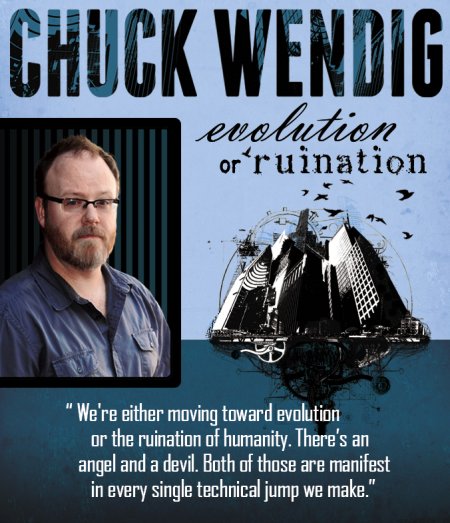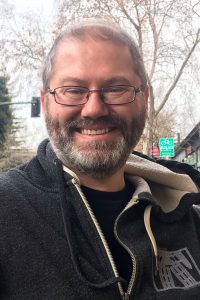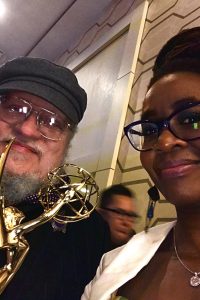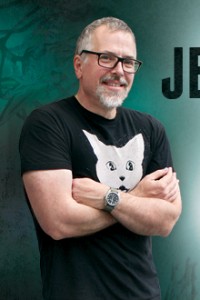Chuck Wendig: Evolution or Ruination

Chuck David Wendig was born April 22, 1976 and grew up in New Hope PA. He attended Queens University in Charlotte NC, where he studied English and religion, graduating in 1998, and ‘‘worked various bizarre day jobs, as many writers do’’ before becoming a full-time freelancer.
He published a story in 1997 as C.D. Wendig, and another in 2000 as C. David Wendig, but the bulk of his fiction publications date from 2009 and after. Some of his short work was collected in Irregular Creatures (2011). He worked extensively as a writer and developer for roleplaying games, contributing to many White Wolf projects from 2002 to 2011, most notably developing Hunter: The Vigil (2008).
Wendig’s first novel was zombie thriller Double Dead (2011), followed by sequel Bad Blood (2012). Blackbirds (2012) began the Miriam Black fantasy series, continuing with Mockingbird (2012), The Cormorant (2013), and The Hellsblood Bride (2015). The Heartland trilogy is Under the Empyrean Sky (2013), Blightborn (2014), and The Harvest (2015). The Blue Blazes (2013) is a standalone. Urban fantasy Unclean Spirits (2013) is first in the Gods & Monsters series. Zer0es (2015) is a thriller about hackers, with sequel Invasive forthcoming. YA novel Atlanta Burns and sequel Bait Dog appeared in 2015 as well.
Wendig’s tie-ins for the Spirit of the Century roleplaying game universe include Dinocalypse Now (2012) and Beyond Dinocalypse (2013). He wrote Star Wars: Aftermath (2015), and has more Star Wars work forthcoming.
With writing partner Lance Weiler, Wendig is a fellow of the Sundance Film Festival Screenwriter’s Lab (2010). They co-wrote short film Pandemic (2011). Wendig wrote interactive fiction Collapsus (2010) and contributed to David Cronenberg’s alternate reality game Body/Mind/Change (2013). Wendig often wrote essays about games and pop culture for The Escapist. He began his popular blog terribleminds.com in 2000, and still actively blogs there about writing and other matters. He has published numerous non-fiction books about writing, notably The Kick-Ass Writer (2013).
Wendig was a finalist for the John W. Campbell Award for Best New Writer in 2013. He lives in Pennsylvania with his wife Michelle Kane Wendig (married 2009) and their son.
Excerpts from the interview:
‘‘I’ve really only been writing books for a couple of years, though I have had the blog for a long time. But I have been, for a goodly portion of my existence, a full-time writer. I always wanted to write, and I turned it into a full-time gig. Early on I did a lot of writing for pen-and-paper roleplaying games, for a company called White Wolf Game Studio, which is no longer around. They were looking for writers, and I played their games at the time. I thought, ‘If I’m going to continue acting the fool and playing games, I’d better make money doing it.’ I answered their call for writers and wrote a pretentious essay for them, about how monster hunting is an internal and external locus of fear. White Wolf was a totally pretentious company, so they bought it.
‘‘My career there succeeded because a lot of the other freelance writers were simply not professional. They either didn’t do the job, or turned in stuff late. You’re supposed to be at least two out of three: fast, friendly, or good. I was fast and friendly – I can’t promise I was good. They kept hiring me. The difference between writing fiction and writing games is that when you’re writing fiction, you’re entirely in your own world, and creating your own story. When you’re writing games, your job is to facilitate someone else telling their story. You giving them bones and pieces and Lego bricks to build with, not a full story. It did take a mental leap to move from games to novels, because there’s a difference between me helping you tell your story in a roleplaying game, and telling my own story. It took me a long time to get into that head space.”
…
‘‘It has long been publisher wisdom that you need social media and websites. I think increasingly, from what I’ve discussed with publishers, it seems they’re figuring out how that actually works. There is unlikely to be a direct correlation between social media and book sales. If every one of my followers bought my books, I’d be doing very, very, very well. (Though I’m happy where I’m at.) An online presence doesn’t hurt. Social media will sell tens of books. I can throw pebbles and ping people, and maybe 50 or 100 copies will move. But if you want to move the kind of copies that will make a publisher happy, the publisher has to do something. They’re the ones who make the big difference when it comes to publicity. There are certainly staggered effects – if you tweet about a book, or blog about it, or do bookstore events, that stuff all adds up. You do need to throw pebbles sometimes. But if you do those things poorly, it doesn’t help. If you don’t like doing public events, don’t do them! As a simple, practical component, if publishers want authors to do marketing, they should probably pay them for that. Part of the reason a writer partners with a publisher is to have them care about the book on a level that the author cannot. If a book is great, you can work on the writing, and a publisher can do what a publisher does.”
…
‘‘We see the Internet as this glorious thing where we’re all connected. That sounds like such an amazing positive, and in a lot of ways it is. But the thesis of Zer0es is this: Imagine you have a tunnel in your house leading to your neighbor’s house. You like your neighbor, so that’s amazing. You can just duck in and hang out with your neighbor. But then your neighbor has tunnels out of her house that lead to her neighbors, and there are tunnels from their houses, and so on. Everybody is connected to everybody’s house… which means that anybody, at any given time, can come into your home. That’s the Internet. We are not really well protected yet. We keep bringing new things online. Smart appliances. Bosch in Germany is trying to lead the way in getting dishwashers and refrigerators online. Your thermostat is now online. People can hack insulin pumps, pacemakers, and other medical equipment, as we get closer to cybernetic implants. That’s not even getting into the information we give up voluntarily: Here’s the dinner I ate, here’s who I’m dating right now, here’s where I’m physically located. All this stuff creates a massive data collection. Everything’s connected, which is amazing and also terrifying. Doing all the research for Zer0es made me more paranoid.”
…
“We’re either moving toward evolution or the ruination of humanity. There’s an angel and a devil. Both of those are manifest in every single technical jump we make. Which one of these do we bet on? Are we going to destroy ourselves with technology, with a nuclear bomb? Or are we going to get nuclear energy? Even a knife can be used to feed my family, or to kill you and take your food. Even the simplest, tiniest technology has a massive polarizing effect on humanity.”
…
‘‘I’m writing the follow up to Zer0es, a novel called Invasive, that takes place in the same universe. The protagonist is a futurist consulting for the FBI. Both books stand alone entirely. There’s one character that drifts over from Zer0es, but it’s an entirely different story. It’s not even about hacking this time. I’m writing comics now, too, and it’s very collaborative, but there’s no style guide. Screenplays are very calculated, everything is very designed, right down to the margins and the font size and type. It’s all one singular format. Comics have no format! It’s the Wild West of formats. I’ve seen scripts that are very detailed, and some that just tell the artist, ‘Make it look good.’ ”
Read the complete interview in the December 2015 issue of Locus Magazine. Interview design by Francesca Myman.





